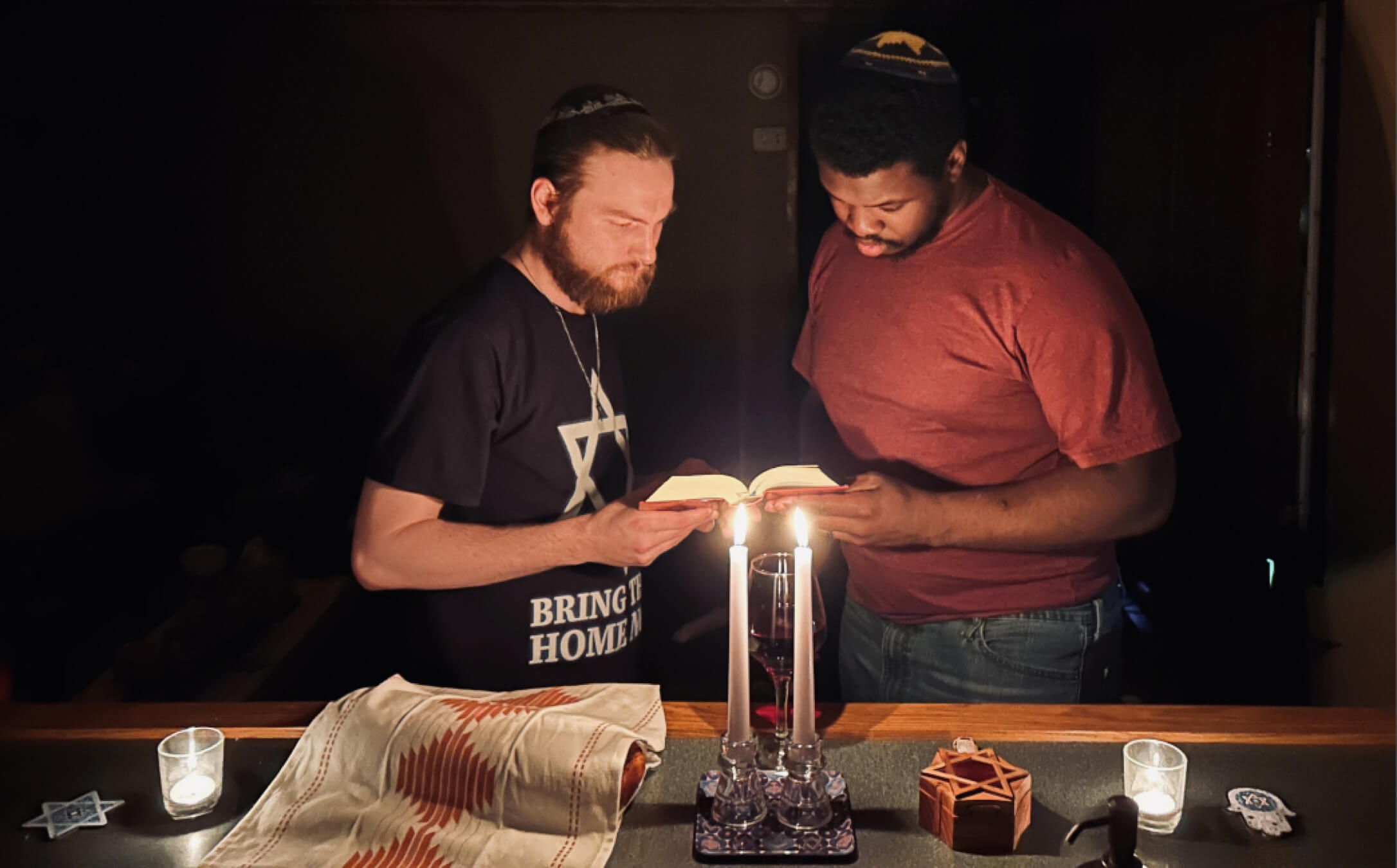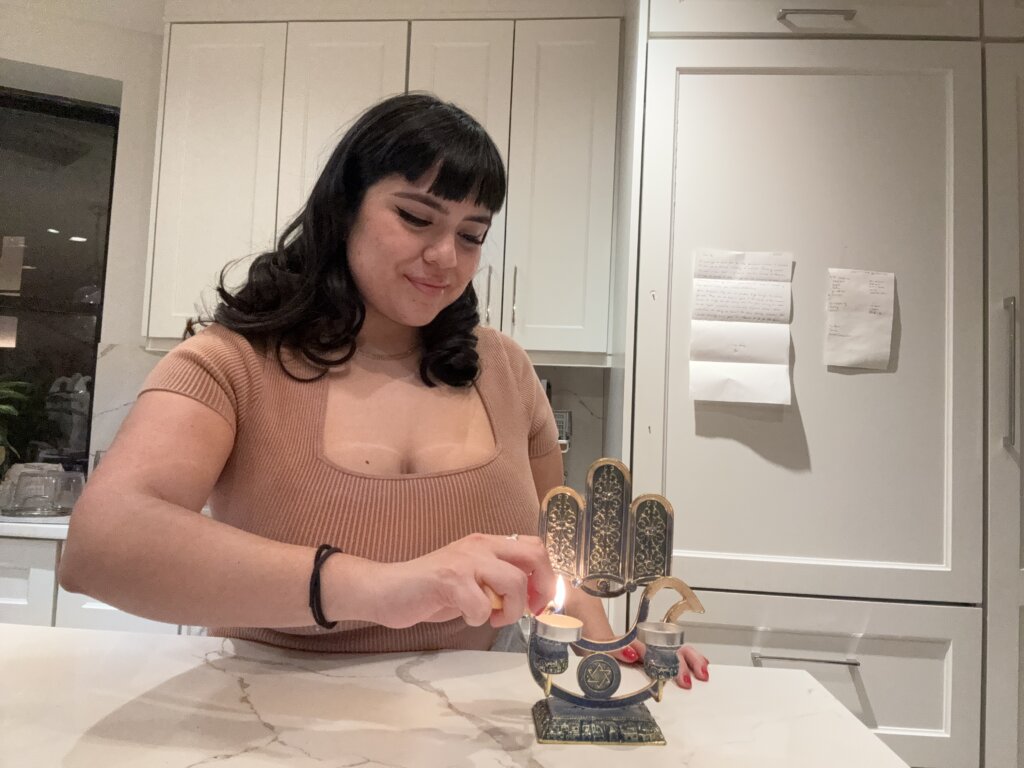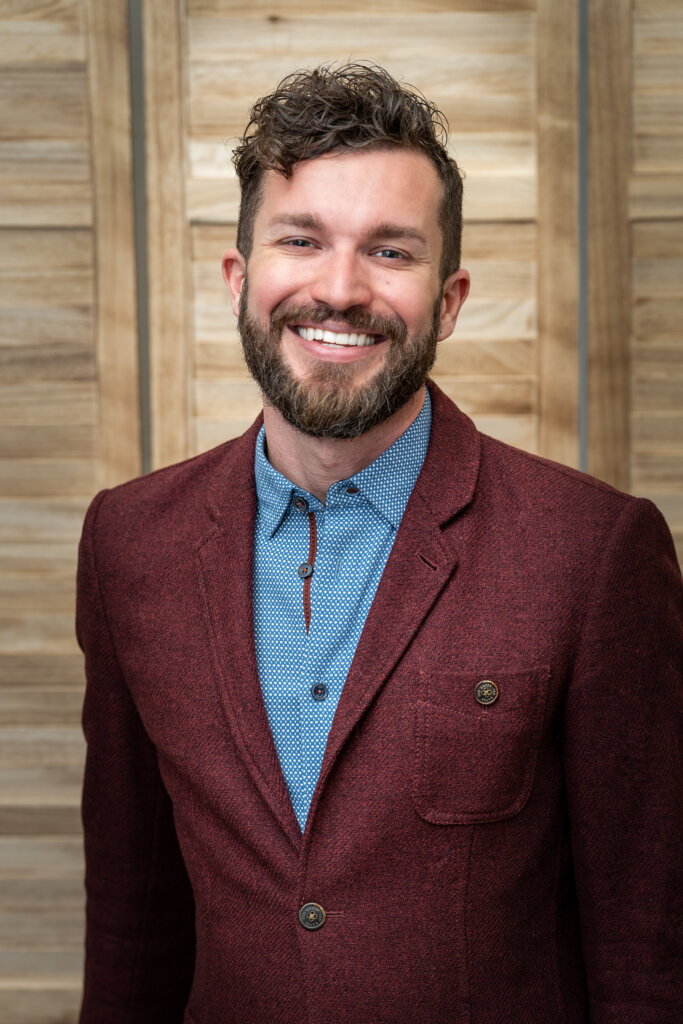Why would anyone convert to Judaism after Oct. 7?
Despite rising antisemitism, interest in conversion is up and those already on the path are sticking with it

Corey Sheffa, left, and his husband Shavon Sheffa, on a recent Shabbat. The Tennessee couple are in the process of converting to Judaism. Courtesy of Corey Sheffa
Corey Sheffa, who lives in a small Tennessee city near the Kentucky border, expects to formally convert to Judaism later this year. He wears a yarmulke, keeps kosher, and observes Shabbat. Shortly after Oct. 7, as he was walking out of a grocery store, a man tried to block his way.
“I hope you and all of your people die, just like Palestine is doing to Israel,” the man told him.
The encounter, along with an earlier one in which his kippah was ripped off his head in a Walmart parking lot and he was called “kike,” shook Sheffa, 24, but did not weaken his resolve to convert. On the contrary, personally experiencing antisemitism only strengthened it.
“It made me realize that I feel Jewish,” he said. “I could die today because I live a Jewish life. If I die, I want to die as a Jew.”
Conversations with more than a dozen people in the process of converting to Judaism during the Israel-Hamas war revealed similarly strong commitments. Many of these future Jews say that Hamas’ Oct. 7 attack on Israel, the war in Gaza, and the recent surge in antisemitism across the globe have only increased their commitment to become Jewish.
Even those who oppose Israel’s military campaign say they still feel a strong pull toward Judaism.
But no matter their feelings on the war, it has inserted itself into their Jewish journey in a way they could not have anticipated. Some are pondering how Israel fits into their new Jewish identity, and — perhaps before they were quite ready — find themselves in uncomfortable conversations, with both Jews and non-Jews who feel differently than they do about Israel’s response to the terror attack.
“This is a moment hitting a deep core for people — our own story of oppression and our disgust at oppression,” said Rabbi Steven Philip, who runs the conversion program at the progressive Mishkan Chicago. The sufferings of two peoples — Jews and Palestinians — “all of these issues are coming into deep friction right now.”
Some who facilitate conversions are encouraging those on the path to conversion to talk about taking this step in such a fraught time for Jews. And many of these Jewish leaders are also noticing that, despite the charged climate, interest in converting — a process that typically involves more than a year of study and appearing before a panel of three rabbis at a mikvah — is only growing.
Here are stories of those converting to Judaism at this moment, and rabbis’ thoughts about why their numbers appear to be growing.
‘More of a fire within me’
Johanna Bolanos decided to become Jewish on Oct. 7, though she had considered converting before that.

She had grown up in a Catholic family turned Christian fundamentalist in Newark, New Jersey. Both her parents became pastors in a church she described as “more of a cult” and required that she go to services six nights a week.
At 18, she ran away and became a hairstylist in New York City, where she made Jewish friends. She said that Jews, their holidays and the way they thought about God appealed to her.
“It was very refreshing to meet people who were of a religion and not have their values pushed upon me or make me feel sinful or bad,” said Bolanos, now 30. “It was very accepting and embracing.”
She began thinking that she would convert to Judaism if she met a Jewish man she wanted to marry.
Hamas’ Oct. 7 terror attack made her realize that she should not wait for a Jewish man.
“Seeing antisemitism rise, seeing all the atrocities on social media, fueled more of a fire in me to want to become Jewish,” she said. She began taking a conversion course the same month.
Bolanos now lives in New Jersey, and attends a Conservative synagogue in Hoboken, where she is also halfway through a conversion course and hopes to complete her conversion by the end of this year. She still hopes, she adds, to marry a Jewish man.
Converting to Judaism, not Zionism
Erev Egan, a 24-year-old trans, non-binary personal chef in Brooklyn, grew up in Maine as a churchgoing Catholic. Egan, who uses they/them pronouns and selected their first name, which is Hebrew for “evening,” as they considered converting, first learned about Judaism in college. That is where they met their Jewish partner, who was active in Jewish life there. (Disclosure: Their partner is my daughter.)
Judaism’s rituals and sense of community appealed to them, as did its encouragement of “learning through questioning” and the way its calendar aligns with the seasons. Egan now takes an online introduction to Judaism course through the Reconstructionist Rabbinical Association.
They identify as anti-Zionist. “My Judaism is not connected to Israel,” said Egan, who has never been to Israel, sympathizes with Palestinian victims in Gaza, and has participated in protests calling for an immediate cease-fire.
But despite their clarity over their relationship to the Jewish state, the Israel-Hamas war has still created tension in their life. The conflict “has brought into harsh contrast what spaces I feel comfortable in and what I don’t,” they said. “Where I feel I can speak freely and where I feel like I just have to smile and nod.”
Egan avoids, for example, talking about the war with their partner’s family, whose members feel more sympathetic to Israel. Those conversations are “too intense,” they said. “We’re not going to convince each other.”
Egan is also struggling to find a rabbi to guide and sponsor their conversion. They know what they want: “an anti-Zionist, trans- and queer-affirming rabbi who is deeply spiritual and relatively traditional” — and how difficult it may be to find someone who checks all those boxes.
“It has probably contributed to my slowness to find a rabbi to guide and mentor me in my conversion,” they said.
‘Immediately felt like home’
Sheffa, the Tennessee man in the process of converting, was raised a Southern Baptist and as a teenager, he said, was “a real Bible thumper.” As a gay man he searched for a Christian denomination more accepting of his sexual orientation, and considered becoming an Episcopal priest.
He moved to Memphis in 2021 to be with his now-husband, Shavon Sheffa, and saw a Reform synagogue on a list of LGBTQ+-friendly local resources. “When we walked in it immediately felt like home,” he said of their first time at Friday night services there. Corey and Shavon Sheffa — Corey took his husband’s last name — decided to convert to Judaism together.
Wanting more tradition, they switched to a Conservative synagogue. Their lives took another religious turn during the pandemic, when they gravitated toward even more traditional observance. The Sheffas found Rabbi John Leener, a graduate of Yeshivat Chovevei Torah, the flagship seminary of the “open Orthodox” movement, which is associated with relatively more flexible attitudes toward women and gay people than most of Orthodox Judaism.
They studied online with Leener, who is based in Brooklyn, and decided to move forward with a local Reform conversion, through a rabbi in Nashville, which Sheffa hopes to complete within the next few months. The couple plans to move to Philadelphia, and within the next few years hopes to convert under Orthodox auspices.
In the meantime, interviewing for jobs in the Bible Belt, he said potential employers tell him that, if hired, he would need to remove his kippah.
“We wanted to find a place where we could be gay and Jewish, and we feel comfortable in Philly,” Sheffa said.
‘It’s time now’
The major Jewish denominations do not track conversions, but Rabbi Rick Jacobs, the head of the Reform movement, the largest stream of Judaism in the U.S., said he has “absolutely” noticed more interest, and added that about 3,000 people a year take its introduction to Judaism class.
And several rabbis working with people considering and working toward conversion report a significant recent uptick in interest.
Some said the increase preceded Oct. 7, when Hamas attacked Israel, killing 1,200 and kidnapping 240. Others said they have seen a spike in conversions since the beginning of Israel’s war with Hamas, which has killed more than 25,000 Palestinians, according to the Hamas-run health ministry in Gaza, and spurred a surge in antisemitism.
Rabbi Sue Oren teaches an introduction to Judaism class for people from 13 Reform, Conservative and independent synagogues in the New York City boroughs of Brooklyn and Queens. “Current student registration is double what it was in past years,” she said. She started to see a dramatic rise last summer. She used to enroll about 25 people in each of the two courses she runs each year. Now there are 51.
Oren isn’t sure how to explain her larger classes, but said that the popularity of genetic testing, which can show that someone has Jewish ancestry, is likely a contributing factor.

Philip, the rabbi who oversees Mishkan Chicago’s conversion program, said he’s seen a “huge wave of interest” in recent years, from a dozen students several years ago to 40 last year and a little more than 40 now. “It’s been rapid growth,” he said, attributing some of it to changes wrought by the pandemic.
Much of Jewish life moved to Zoom then, lowering barriers to entry into a Jewish community, he said. “It is less scary to tune in online than it is to walk into a synagogue.”
And he agrees with Oren that family tree DNA testing has played a role too: “23andMe brought out an interesting wave of people with reports that say they are two or five percent Jewish,” he said, referring to a popular genetic testing company. People find they have a little or perhaps more than a little Jewish ancestry, want to know more, and sometimes sign up for an introduction to Judaism class.
He said while the war presents challenges for Jews and those contemplating conversion to Judaism, no one has dropped out of the program since Oct. 7.
Many of his students struggle amid rising antisemitism and how they should respond to it, he said. They’re also unsure how much they should engage in debates over the Israeli-Palestinian conflict.
“Conversion students now are being asked to form a more personal relationship with the state of Israel, whether critical or proud, within a crisis that is trying to push us towards a more black-and-white rhetoric,” he said.
“It can be hard to find your voice when being pushed to take a stance.”
But as Oct. 7 and its aftermath has complicated conversions, it has also drawn non-Jews to Judaism.
At Town & Village Synagogue in Manhattan, part of the Conservative movement, Rabbi Laurence Sebert said he has received at least half a dozen calls in the past few months, “from people saying, ‘I’ve been thinking about doing this and after Oct. 7 — it’s time now.’”
“They have a feeling that they want to stand up for and with the Jewish people and become part of the Jewish people,” he said. “I find that extremely inspiring.”
And Rabbi Yisroel Ciner, of Orthodox Congregation Beth Jacob of Irvine, California, said while he’s had to start a conversion class in the past few years because he now has too many students to teach them individually, he’s noticed an additional spike in interest in recent weeks.
War and crisis can move people to act, Ciner said.
“When the going gets tough it seems to strengthen their conviction,” he said. “It inspires them to become part of something greater.”






















